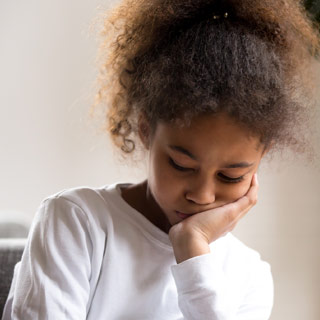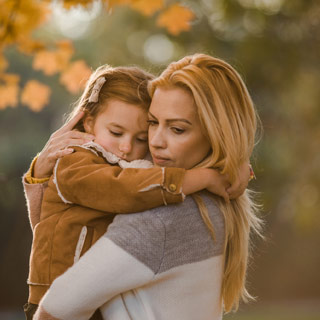

Help Kids Cope With Stress
All kids feel stressed at times. And it’s common for kids to have some fears and worries. At every age, parents can help kids build their inner strength and confidence.
-

Childhood Stress: How Parents Can Help
Stress takes different forms. In small amounts, it's a signal to get ready and helps kids rise to a challenge. Find out about some types of stress and how you can best help in each situation.
-

Helping Kids When They Worry
Worry is a natural response to a big event, change, or challenge. It's a way of thinking ahead: "Am I ready for this? How will I do it?" Here's how parents can help kids face new things without letting worry hold them back.
Things to Read and Do With Your Child
-
Everyone feels stressed at times. With a parent's help, kids can learn that a little stress is normal. It can even be a good thing — a "get ready" signal to help kids handle everyday challenges.
Invite your child to tell you about a time when they felt stressed. Did they feel it in their body? Did they notice it in their mind? How did they cope? You're asking these questions to give your child a chance to share. Listen to be supportive. Let your child know you understand what it's like for them. You can say things like, "Yes, butterflies! I know that feeling."
Here are two articles for kids ages 8-12. Read them with your child. Take some time to go through the tips together. Help your child practice them.
What is stress, and why do kids feel it?
What can kids do when they feel stressed?
-
Stress isn't always a bad thing. Instead of avoiding things that feel stressful, help your child see stress as a reminder to prepare to handle those things.
Ask your child what stresses them in their everyday life. A big test or tryout? Stress can help kids focus and prepare. Making friends or trying something new? Stress may feel uncomfortable, but kids can find the courage to go ahead anyway. When they find out they can handle it, they might be surprised at how well things go. Next time, it won't be so stressful.
Read the pages linked below with your child. Talk about the ways stress can help in different situations. Maybe it offers a gentle push to study for that test. Or it builds the confidence that helps kids make new friends. When kids see they can cope with stress, they feel more capable.
-
From friendships to family bonds, strong relationships help kids become more resilient to life's ups and downs. Talking about feelings is a good way for kids to connect with others and know they're not alone with a problem or worry. Being able to identify feelings also helps kids build emotional strength and good social skills.
This article for kids ages 8-12 has ideas on how to name and explore feelings. It's a great thing for you and your child to do together. How many feelings can you name?
-
Good food, a good workout, and good sleep every day helps kids feel alert, rested, strong, and full of energy. Those things add up to a happier mood — and help kids cope better with stress.
Being mindful is a skill that kids can build to help them slow down, take their time, and focus in a calm way. It's the opposite of feeling stressed, rushed, and distracted.
To build healthy habits, kids need a parent's help and support. Good habits take practice. The links below are written at your child's level. Go over the ideas together. Let your child take the lead to choose one healthy habit to start. Ask what you can do to help them succeed. Even better, work on a skill together. Be sure to set a good example. Make time each day to practice. Notice and talk together about what new habits you like best so far.
Eat good food, get good sleep, and play together!
What if We Need More Help?

What if my child is too stressed to cope?
Stress or adversity that's too intense can overwhelm a child's ability to cope. Stress can be harmful when it's sudden, like a bad accident or the death of someone close, or if it lasts too long and kids don't have a break from it. Over time, too much stress can affect kids' mental and physical health. When kids seem overwhelmed by stress, they may need extra help to heal. Ask your doctor about therapy and ways you can help your child.

What if my child worries too much?
Too much worry can be a sign a child needs extra help. Worry that happens too often or takes up too much of a child's time and energy could be a sign of an anxiety disorder. When kids can't be apart from their parent, even to go to school or a sleepover, it may be a sign of separation anxiety disorder. Or, when kids worry many times a day about the same things, it could be a sign of OCD. Therapy can help kids learn to let go of these worries and enjoy life.


